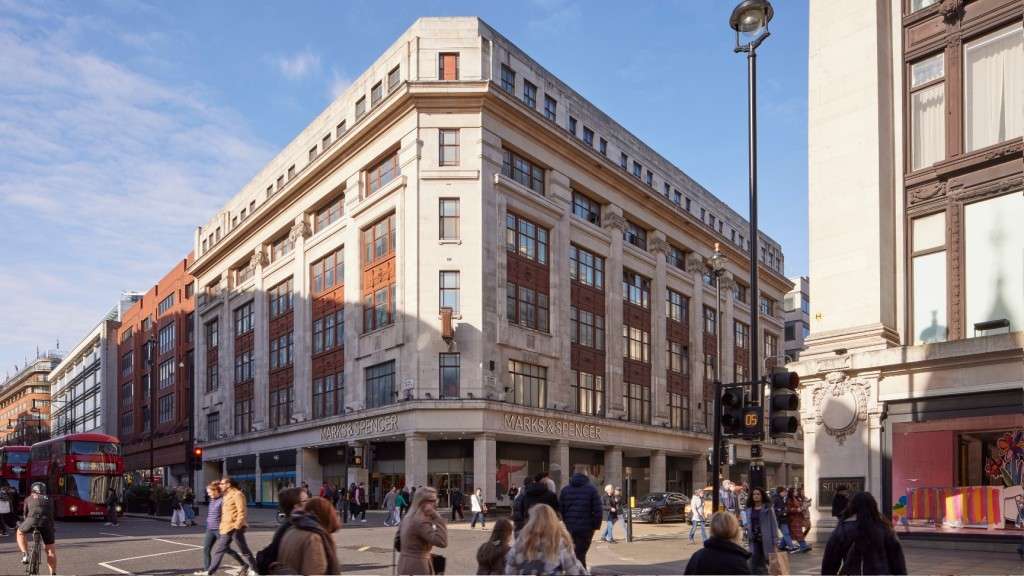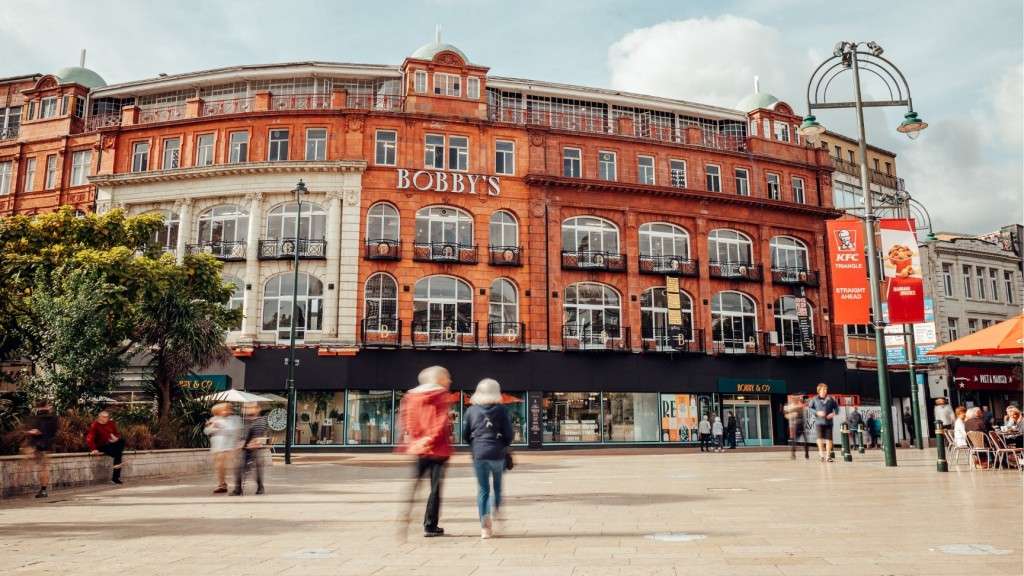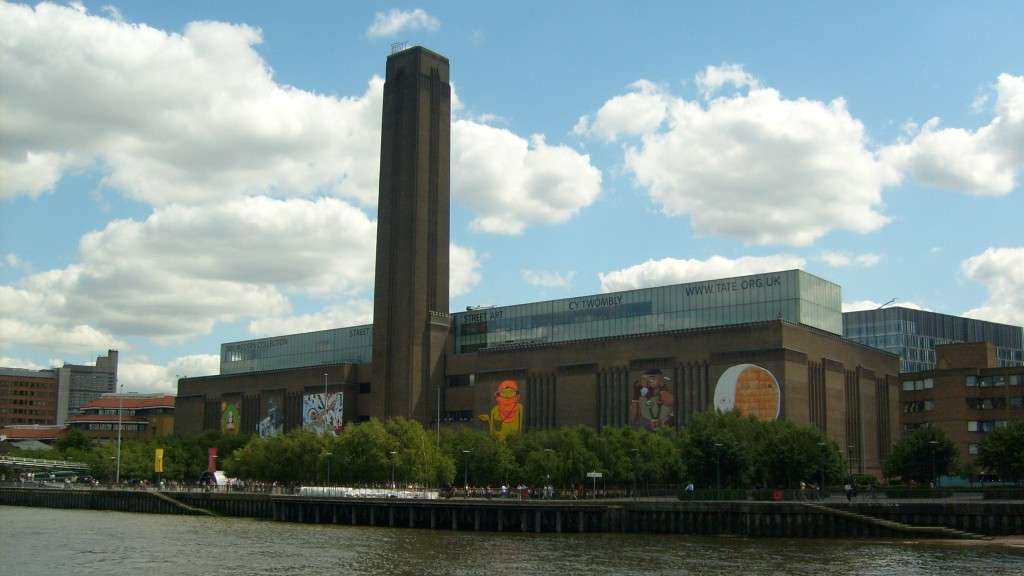PRESS RELEASE: SAVE Britain’s Heritage calls for urgent reforms after M&S ruling highlights gaping holes in national planning system
National planning policy must catch up with legislation and climate science, says charity that brought landmark M&S case to national attention
It’s time to stop incentivising demolition
6th December 2024
SAVE is calling for urgent reform to national planning policy after the government’s short-sighted decision to allow Marks & Spencer to demolish its flagship building on Oxford Street issued.
It follows Secretary of State Angela Rayner’s highly anticipated decision on 5th December which gave M&S permission to demolish their landmark 1930s department store building for a replacement office block and ground floor food store next door to world famous Selfridges.
The high-profile case has revealed gaping holes in the UK’s national planning policy. It’s time policy caught up with widespread public and industry opinion. There is still no national policy on embodied carbon emissions from buildings, despite the built environment accounting for a quarter of the UK’s total Green House Gas emissions – and the UK’s legal commitment to reducing emissions.
We need clear rules and a level playing field so that building owners or developers think twice before demolishing reusable buildings. Many developers see the potential of re-using buildings, but want clear guidelines and parameters – not a policy vacuum.
It’s time to stop incentivising demolition.
Today SAVE is calling for reform to:
Strongly prioritise re-using historic buildings in national planning policy.
End permitted development rights that allow building owners to side step the planning permission process to achieve quick demolition permits.
Count the carbon emitted by the construction of buildings, not just the carbon emitted when they’re in use. Current policy focuses on so-called “operational carbon”, yet “embodied carbon” is a significant factor.
The urgency is clear. Just last month at Cop29, UN Secretary General Antonio Guterres said 2024 has been “a masterclass in climate destruction”. At the same event, British Prime Minister Keir Starmer committed the UK to an ambitious new target to slash carbon emissions by at least 81% on 1990 levels.
Embodied emissions from the demolition and construction of buildings equates to 40 to 50 million tonnes of CO2 per year, that is more than emissions from aviation and shipping combined.
Henrietta Billings, director of SAVE Britain’s Heritage, said: “These are big numbers that can be tackled. Rethinking our wasteful knock-it-down-and-start-again approach to development and re-using and updating existing buildings like M&S Oxford Street is a win-win. It’s good for the planet and it’s good for our towns and communities.
"No-one is suggesting these buildings are pickled in aspic – it’s a pro-growth approach. Restored and transformed buildings have turbo-charged regeneration all over the country, everywhere from Tate Modern in London to former department stores in Bournemouth, Bristol, Edinburgh and Gloucester.
"Our campaign has triggered unprecedented media and public interest and has shown – through the support we received from architects, developers and engineers and our joint AJ/SAVE Re:store architectural ideas competition –that there are plenty of creative ideas and appetite. What industry needs now is clear direction from government. That’s why we’re calling today for urgent policy reforms.”
Simon Sturgis, Founder of Targeting Zero, government adviser on sustainability and SAVE’s expert witness at the public inquiry said: “The Secretary of State's decision on M&S continues the uncertainty with respect to prioritising retrofit over demolition. As we approach Net Zero in 2050 it is inevitable that retrofit will become increasingly crucial in helping achieve government carbon and waste reduction targets. The government now needs to ensure that net zero legislation is embedded in planning policy to make it fit for dealing with the climate crisis of the 21st century.”
Alec Forshaw, former head of conservation at Islington Council and SAVE’s expert witness on heritage and planning at the public inquiry said: “The demolition of Orchard House will be a sad loss for Oxford Street, and shows how vulnerable are unlisted buildings located outside conservation areas. Heritage-led regeneration, rather than demolition and redevelopment, needs to remain at the forefront of re-imagining our high streets.”
Tyler Goodwin, founder and CEO of Seaforth Land said: “SAVE’s M&S campaign has been a defining case for the property industry at a critical moment in history. As a developer, I see the clear commercial benefits of reusing historic buildings. Tenants are relying on their office space to win the war for talent and to earn their commute back to the office, and we are seeing a material shift in demand for best-in-class buildings that can offer a unique, authentic, and sustainable office experience that a generic glass box just can’t provide.
“If M&S don’t want Orchard House, I’m confident there is an exciting adaptive reuse scheme in its future.”
Simon Henley, principal of the twice RIBA Stirling Prize-nominated architecture practice Henley Halebrown said: "Rayners' decision is hugely disappointing. Here was an opportunity for the new government to establish a clear policy position on the environment, to make a clear statement about embodied carbon and to recognise the embodied memory of place and building, here Oxford Street and M&S. A shortsighted and unjustifiable decision. SAVE Britain's Heritage have repeatedly demonstrated the case for refurbishment and retrofit."
Background
The M&S campaign has helped move the dial on the property and construction industry’s disposable attitude to buildings towards a “retrofit-first” approach.
For the first time it placed heritage and climate change centre stage and unleashed a tide of support from architects, planners, historians and celebrities including Kristin Scott Thomas and Bill Bryson, George Clarke and Kevin McCloud.
Our campaign made headlines in all the national papers and caught the imagination of the public who generously crowdfunded £20,000 towards our legal fees. The then communities secretary Michael Gove ruled in SAVE’s favour in July 2023, but after a legal challenge by M&S on procedural grounds the case was sent back to the new Secretary of State Angela Rayner for re-appraisal and re-determination.
The dial is changing
Our arguments are already helping to change policy and practice in a material way. Many local authorities – including Westminster and the City of London – have begun introducing retrofit-first policies that require developers to consider re-use rather than automatically reaching for the wrecking ball.
At the same time, growing numbers of developers are enthusiastically embracing retrofit, reporting that clients increasingly want buildings with the personality and environmental values to attract Gen Z back into the office.
Just a few hundred meters from M&S on Oxford Street, a number of big stores are currently the subject of high-profile retrofits – including the former House of Fraser, another 1930s department store, and the old Topshop at Oxford Circus which will reopen as a flagship Ikea. TKMaxx have just opened a new store in a 1930s building just a block away from M&S on Oxford Street, and Foster and Partners are repurposing Fenwicks on Bond Street.
Industry is moving behind the change, as shown by the Architects’ Journal’s pioneering Retrofirst campaign, plus initiatives like Don’t Waste Buildings, Part Z and LETI.
Ends
Notes for editiors:
1.For more information contact: Henrietta Billings, director, SAVE Britain’s Heritage on office@savebritainsheritage.org or 020 7253 3500
2. See SAVE’s previous press releases on the M&S campaign here including the previous Secretary of State’s decision refusing demolition and re-build.
3. See SAVE’s open letter signed by leading architects, developers and built environment experts to Angela Rayner regarding the M&S buildings in August 2024.
4. In May 2024 SAVE and Architects Journal hosted Re:Store, a widely reported design ideas competition for the M&S buildings, hosted by Ravensbourne University, London.
5. SAVE is a national heritage charity that campaigns for the protection and re-use of historic buildings of all types and ages. In 2025 we will celebrate our 50th year – major campaign successes include The General Market, Smithfield, London, Wentworth Woodhouse, Rotherham south Yorkshire and the Welsh Streets, Liverpool.



